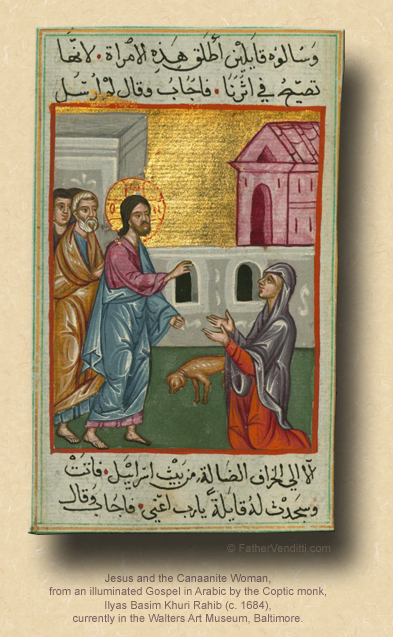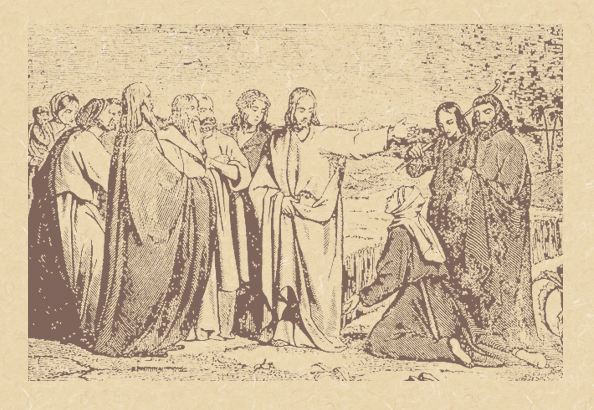Kibbles 'n Bits.
The Eighteenth Wednesday of Ordinary Time.
Lessons from the secondary feria, according to the ordinary form of the Roman Rite:
• Jeremiah 31: 1-7.
• [Responsorial] Jeremiah 31: 10-13.
• Matthew 15: 21-28.
The Tenth Wednesday after Pentecost.
Lessons from the dominica,* according to the extraordinary form of the Roman Rite:
• I Corinthians 12: 2-11.
• Psalm 16: 8, 2.
• Luke 18: 9-14.
The First Wednesday of the Dormition Fast; and, the Feast of Our Venerable Fathers Isaac, Dalmatus & Faustus.**
Lessons from the pentecostarion, according to the Ruthenian recension of the Byzantine Rite:
• II Corinthians 6: 11-16.
• Mark 1: 23-28.
FatherVenditti.com
|
 9:50 AM 8/3/2016 — Last Sunday, when the Scripture lessons of the Mass put before us the whole theme of death and judgment and the possibility of eternal damnation, I had left you with a question: which Jesus are you going to follow? The Jesus of the warm fuzzy, commanding nothing and forgiving everything; or, the Jesus of the Gospel, who reminds us that we will be judged according to our deeds, and that some of us will probably not be saved (cf. Luke 17: 34-45). Today’s Gospel lesson is another of those which bludgeons us with an inconvenient truth; for, in it, our Blessed Lord is approached by a woman who is drawn to Him solely by faith, seeking nothing for herself, but begging Him to help her tormented daughter. He ignores her, so the Gospel tell us; but, she's so persistent in her pursuit of our Lord that the disciples ask Him to “Rid us of her…, she is following us with her cries” (Matt. 15: 23 Knox). He turns to her and says, “My errand is only to the lost sheep that are of the house of Israel” (v. 24 Knox). In other words, “I'm not going to help you; you're not even a Jew.” And I'm sure you're waiting with baited breath for me to explain to you how our Lord isn't really saying what He seems to be saying, and how this is all the result of some inferior translation. 9:50 AM 8/3/2016 — Last Sunday, when the Scripture lessons of the Mass put before us the whole theme of death and judgment and the possibility of eternal damnation, I had left you with a question: which Jesus are you going to follow? The Jesus of the warm fuzzy, commanding nothing and forgiving everything; or, the Jesus of the Gospel, who reminds us that we will be judged according to our deeds, and that some of us will probably not be saved (cf. Luke 17: 34-45). Today’s Gospel lesson is another of those which bludgeons us with an inconvenient truth; for, in it, our Blessed Lord is approached by a woman who is drawn to Him solely by faith, seeking nothing for herself, but begging Him to help her tormented daughter. He ignores her, so the Gospel tell us; but, she's so persistent in her pursuit of our Lord that the disciples ask Him to “Rid us of her…, she is following us with her cries” (Matt. 15: 23 Knox). He turns to her and says, “My errand is only to the lost sheep that are of the house of Israel” (v. 24 Knox). In other words, “I'm not going to help you; you're not even a Jew.” And I'm sure you're waiting with baited breath for me to explain to you how our Lord isn't really saying what He seems to be saying, and how this is all the result of some inferior translation.
But there's nothing wrong with this translation. He appears to be rude to this poor woman because He is. He seems to be telling her that, because she's not of the same nationality as He, He's not interested in her problem because that, in fact, is what He's telling her. There is no mistake. He even goes so far as to get personally abusive, telling her, “It is not right to take the children’s bread and throw it to the dogs” (v. 26 Knox); and, if you're a woman who's ever been called a dog by a man, I can only guess what that must feel like.
Of course, there is a method in our Lord's madness which has deep implications for our interior life, and we'll get to that in a moment; but, consider first how this poor woman reacts to this very brazen insult: "Yes, Lord, yet even the dogs eat the crumbs that fall from their masters' table" (v. 27 RSV). Now, I don't think there's a woman here who, if they went to a man for help, and he responded by calling her a dog, wouldn't just haul off and slap him silly; but, remember, this woman is desperate. Saint Anselm tells us, in one of his homilies (cf. Golden Chain, MT-MK 4521), that it's clear from the text that this woman clearly believed that Jesus was God, something that most of the Jews with our Lord that day probably didn't yet realize. Keep in mind, too, that she's a Canaanite. The Canaanite's were a race of people who had been Jews, but had abandoned the faith and fallen into apostasy, so the Jews threw them out of Israel so as not to be corrupted by them. She's sneaked back across the border for the sole purpose of asking our Lord to help her tormented daughter; she doesn't even want anything for herself. And unless you’ve lived most of your life under a rock, you’ll know from experience that desperation has a way of tearing down the walls of pride. She's come there with a mission, and she's not about to let anything derail her from it, even if it means she has to swallow her pride and take an insult without responding to it.
And here is where we are able to deduce the method in our Lord's madness. He's not so much testing her;—as Saint Anselm told us, she already believes He's God, and He knows this, so He doesn't need to test her faith—but, she does need to be instructed as to why she's doing what she's doing. She's gone there because—as we've said three times now—she's desperate. Her daughter is suffering, she knows that Jesus is in a particular place at a particular time, so she's off. She's not even thinking clearly. By treating her the way He does initially, our Lord forces her to put the breaks on and think about what she's doing, not because there's anything wrong with what she's doing, but because he wants her to understand her own actions: Tunc respondens Jesus, ait illi: O mulier, magna est fides tua: fiat tibi sicut vis. “And at that Jesus answered her, ‘Woman, for this great faith of thine, let thy will be granted’” (v. 28 Knox). She had no idea that she was acting out of faith, but now she does, and so do the disciples who had initially begged Him to send her away; so, what we have in this episode in the life of our Blessed Lord is just another example of what’s been presented to us on and off all summer: a lesson about the permissive will of God, and how God will often allow a cross or hardship to come our way as a means of enacting a change in us.
There is not a person here who hasn't suffered a tragedy or endured a hardship or borne a cross that hasn't caused us to wonder what on earth God is up to. Like the Canaanite woman, we are already people of faith, and so we ask, “Why is this happening? What have I done wrong?” The answer is that we've done nothing wrong; but, if God were to reveal to us the reason for our suffering, or show us his plan for us, then there would be no merit in the sacrifice. As we already observed in celebrating the memorials of many of the saints presented to us this time of year, when one sets out to serve the Lord, one doesn't do what one wants; one does what one is told. Saint Paul said it better:
O the depth of the riches of the wisdom and of the knowledge of God! How incomprehensible are his judgments, and how unsearchable his ways! For who hath known the mind of the Lord? Or who hath been his counsellor? (Rom. 11: 33-34 DRA).

* In the extraordinary form, on the ferial days outside of privileged seasons, the lessons are repeated from the previous Sunday.
** Isaac, a Syrian, founded a monastery in Constantinople in 381, and later was elected Abbot of the Monastery of Dalmatia, dying in 406. Dalmatus and his son, Faustus, were his disciples; they gave him their personal fortune to build the monastery in Constantinople, and took over it's administration when he went to Dalmatia. Damatus later attended the Third Eccumenical Council in Ephesus in 431, dying in 440.
|

